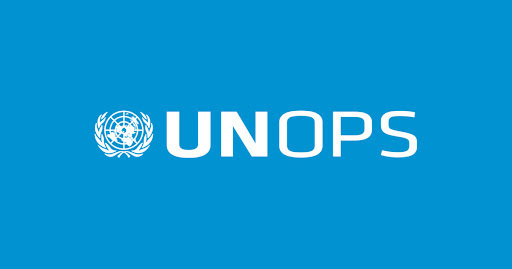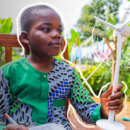The United Nations Office for Project Services (UNOPS)
Better work environments in the fight against Ebola

Guinea battled one of the worst outbreaks of Ebola in its history in 2014 and 2015. Now under control, forty-one healthcare centres across the country are being rehabilitated and renovated to keep it that way.
UNOPS and the Government of Guinea, with funding from the World Bank, established a $20 million operational platform to support the fight against Ebola. The $5.5 million dedicated to infrastructure development promises a stronger national health sector, with better working conditions for health workers and access to care for Guineans.
The rehabilitation or construction of the rural health centres, complete with equipment, began in 2015 and will be finished this year. The project could not have come at a more crucial time for the country, with over 2,000 Ebola deaths recorded by the end of 2015.
UNOPS expedited the project, undertaking financial and technical evaluations, and procurement activities. The beginning of works coincided with the rainy season, adding to the challenges that needed management.
Now with the newly rehabilitated infrastructure and awareness campaigns the population is returning to the health center and sometimes we actually consult with twice as many patients as compared to before the rehabilitation.
Deputy Chief of the Farmoriah Health center, Dr. Moriba Paul Haba, explained: "When Ebola was first found in the region the population fled the health center and preferred to consult traditional medicine men. Now with the newly rehabilitated infrastructure and awareness campaigns the population is returning to the health center and sometimes we actually consult with twice as many patients as compared to before the rehabilitation."
Work began with individual assessments of each centre. Existing infrastructure was overhauled and rehabilitated to make the facilities accessible and safe for the workers that use the space. This included renovating bathrooms, fixing surrounding fences and constructing or repairing water towers. Solar panels and waste treatment equipment, such as incinerators, will be procured and installed.
Caption
- A father and his daughter wait patiently in front of the recently rehabilitated Wonkifong Health Centre Office.

One of the first centres to be renovated was the Benty Health Centre, which was originally constructed in the early 90s and had since fallen into a state of disrepair.
"Before the rehabilitation, drinking water was not available and any water had to be collected in a well far away from the centre, which made hygiene difficult to maintain. Now, with the available drinking water from the new borehole, health personnel can work in much better conditions and provide improved health services to the population, especially for the delivery of babies."- N'Touma Toure, midwife at the Farmoriah Health center.
The UNOPS team selected, trained and supervised 23 local companies, five of which are managed by women, to complete the rehabilitation works. Two three-day training sessions were organized to build capacities of around 50 national construction companies in procurement and contract management.
The first three health centres of Benty, Farmoriah and Wonkifong were officially handed over in 2015. So far, the rehabilitation of the 41 centres created 3,370 days of paid work for local people.
The 38 remaining health centres will be handed over by the first-quarter of 2016 and all together will serve approximately one million people.
UNOPS is currently delivering over $40 million in projects in Guinea. Visit our data page to find out what else we are doing in the country.










